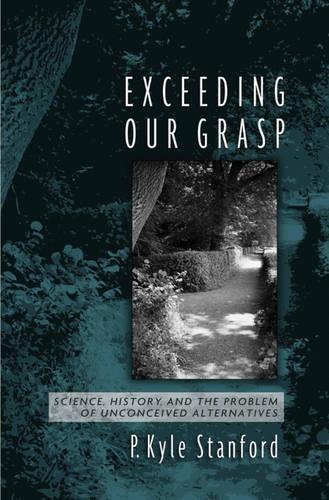Overview
The incredible achievements of modern scientific theories lead most of us to embrace scientific realism: the view that our best theories offer us at least roughly accurate descriptions of otherwise inaccessible parts of the world like genes, atoms, and the big bang. In Exceeding Our Grasp, Stanford argues that careful attention to the history of scientific investigation invites a challenge to this view that is not well represented in contemporary debates about the nature of the scientific enterprise. The historical record of scientific inquiry, Stanford suggests, is characterized by what he calls the problem of unconceived alternatives. Past scientists have routinely failed even to conceive of alternatives to their own theories and lines of theoretical investigation, alternatives that were both well-confirmed by the evidence available at the time and sufficiently serious as to be ultimately accepted by later scientific communities. Stanford supports this claim with a detailed investigation of the mid-to-late 19th century theories of inheritance and generation proposed in turn by Charles Darwin, Francis Galton, and August Weismann. He goes on to argue that this historical pattern strongly suggests that there are equally well-confirmed and scientifically serious alternatives to our own best theories that remain currently unconceived. Moreover, this challenge is more serious than those rooted in either the so-called pessimistic induction or the underdetermination of theories by evidence, in part because existing realist responses to these latter challenges offer no relief from the problem of unconceived alternatives itself. Stanford concludes by investigating what positive account of the spectacularly successful edifice of modern theoretical science remains open to us if we accept that our best scientific theories are powerful conceptual tools for accomplishing our practical goals, but abandon the view that the descriptions of the world around us that they offer are therefore even probably or approximately true.
Full Product Details
Author: P. Kyle Stanford (Assistant Professor of Logic and Philosophy of Science, Assistant Professor of Logic and Philosophy of Science, University of California, Irvine)
Publisher: Oxford University Press Inc
Imprint: Oxford University Press Inc
Dimensions:
Width: 16.20cm
, Height: 2.20cm
, Length: 24.10cm
Weight: 0.513kg
ISBN: 9780195174083
ISBN 10: 0195174089
Pages: 248
Publication Date: 25 May 2006
Audience:
College/higher education
,
Professional and scholarly
,
Undergraduate
,
Postgraduate, Research & Scholarly
Format: Hardback
Publisher's Status: Active
Availability: To order

Stock availability from the supplier is unknown. We will order it for you and ship this item to you once it is received by us.
Reviews
The book is highly recommended to anyone interested in the comtemporary debate about scientific realism. It shows with particular clarity and at a remarkable level of historical scholarship how detailed historical analyses can bear on this debate. History, Philosophy and Life Science
Author Information
P. Kyle Stanford is an Associate Professor in the Department of Logic and Philosophy of Science at the University of California, Irvine. He obtained his Ph.D. in 1997 from the Department of Philosophy and the Science Studies Program at the University of California, San Diego. His articles on the history and philosophy of science have appeared in The Journal of Philosophy, Philosophy of Science, and elsewhere. This is his first book.



